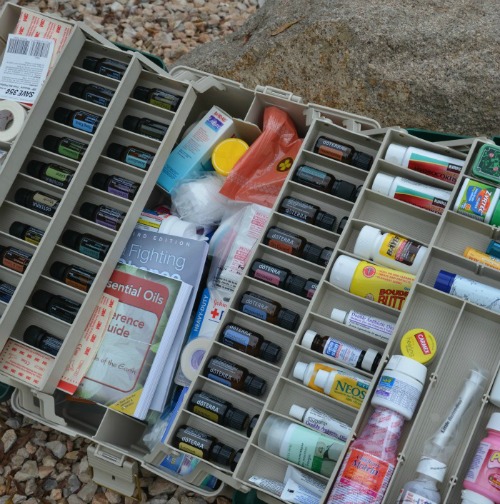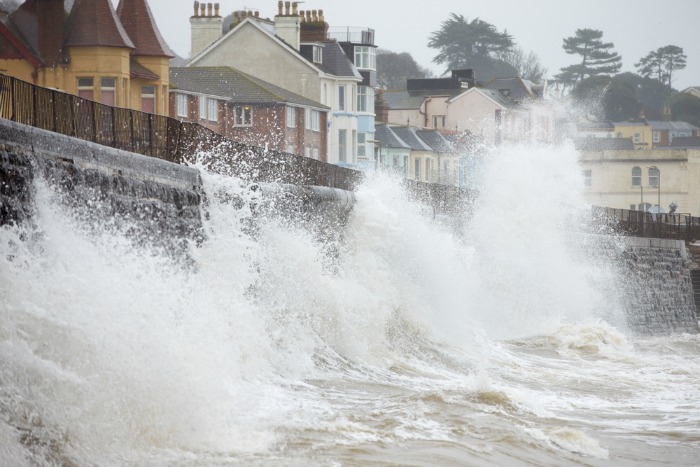
If you’re still wondering how to get your family prepared for survival from disasters and general emergencies, let’s get on it today, not tomorrow. If you want to know where to start, or if you are halfway there, today’s post should be very helpful in completing the task. If your family is totally prepared, that’s awesome. I think in Utah, the statistics for families being prepared are about 10% of the people living here. That’s surprising!
I interview people all the time. I talk with local church leaders of all denominations. I’m really scared, not for me, but for those who should know better when it comes to being prepared for a survival scenario. Whether you consider yourself to be in the ranks of other preppers, we have been told for years by various churches, state leaders, and other government agency leaders to get our families prepared for earthquakes, hurricanes, tornadoes, fires, famine, and other disasters.
We haven’t been warned just for the last few days or weeks based on recent events like the earthquake in Northern California, it has been a warning for years. We need to be prepared for a loss of income, power outages, ice storms, snowstorms, and other events we might call natural disasters. I tip my hat to all those truck drivers that drive HUGE semi-trucks so we can have water, food, gasoline, and all the other necessities of life we may take for granted every day.
They are subject to ice storms, snow storms, hail, extreme weather conditions, and other challenges to bring every family those essentials we need on a daily basis. If you see a semi-truck on the highway, give them the courtesy they deserve on the road, and maybe a friendly honk and a wave too.
If we have a major disaster or an unforeseen emergency that becomes a survival scenario, these awesome trucks may be parked and unable to deliver the items we need. Therefore, I am begging you to get prepared for a disaster or an unforeseen emergency since self-reliance is a powerful skill to have.
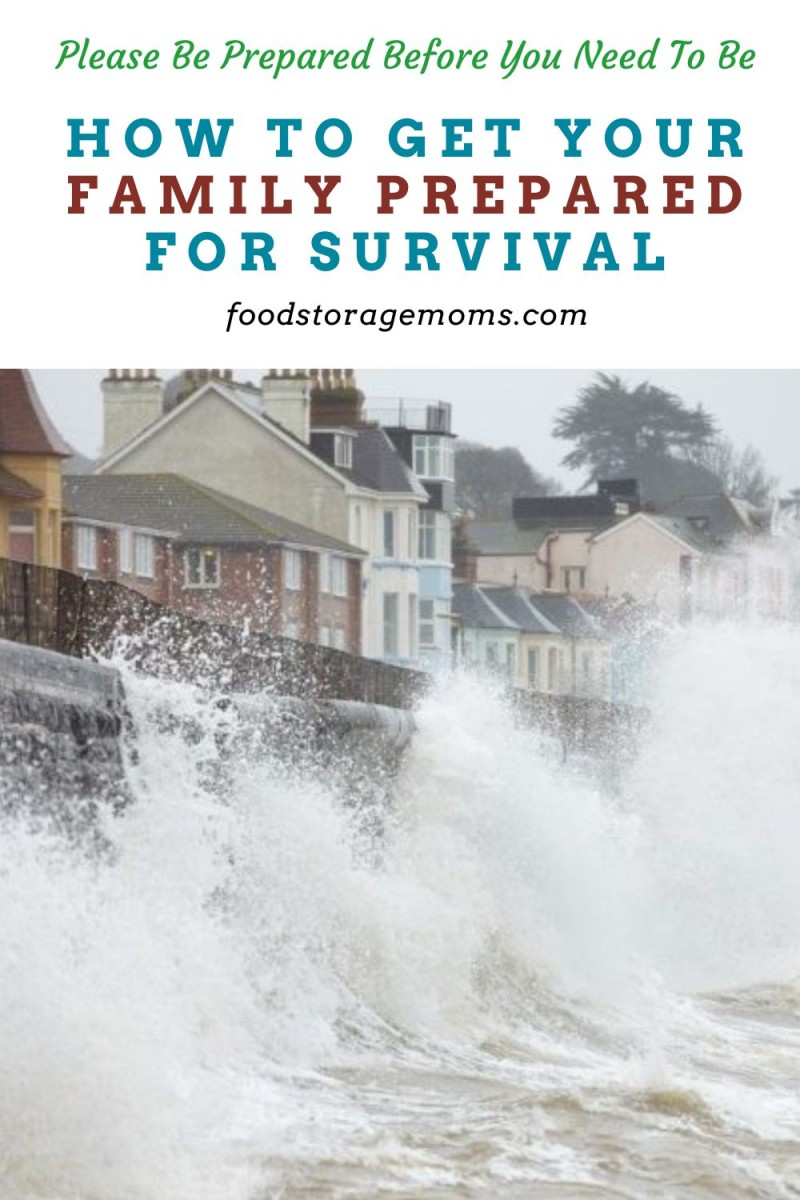
Three Hours-Three Days-Three Weeks
If you couldn’t leave your home for three days, three weeks, or maybe even three months, how would you fare? Do you have much water, much food, and the needed cooking devices with fuel stored so you could prepare meals? What about first aid supplies?
The things we discuss here are the bare minimum items we may need if the roads are shut down and the stores are empty. If we have a power outage you won’t be able to fill your car to go to another town to get water if your town’s supplies are depleted or contaminated. Water supplies are so critical for survival, yet few people have planned ahead and have sufficient for their needs.
These are real situations that have happened all over the world, not just in our country. The government will not, and cannot help everyone. Once they rally their resources to help you, it could possibly be days, weeks, or months in some drastic situations. I think sometimes people are complacent thinking nothing ever happens where they live.
Well, we better think again, because things are happening when and where people least expect it. It’s crazy, but we read every day about areas struggling with drought, yet others are dealing with floods. Climate changes are a fact of life, and we need to adjust our thinking and emergency preparedness plans to deal with the new realities.
If you haven’t read my book, please consider ordering the hard copy so you can teach your family how to be prepared. It’s a family-friendly book with ideas we all need, I promise.
If we have a grid down, our country is very vulnerable and this makes me realize this is just one event to show why we all need to be prepared. “Lights Out: A Cyberattack”, A Nation Unprepared, Surviving the Aftermath. I bought the hard copy as well as the audible version.
Another book I think is very important and I recommend to have for everyday use and to have a hardcopy available after a disaster is this one: The Survival Medicine Handbook: A Guide for When Help is Not on the Way
Please get hard copies of these books because if the power is gone you will have nothing to rely on when it comes to electronic devices to access the information. Yes, solar works, and I have several sources of solar power, but after a disaster, you will want my book and a medical book.
The doctors won’t be immediately available and the pharmacies won’t be able to fill prescriptions without power or access to your medical records.
Get Your Family Prepared:
Water:
We can’t survive without water, we need the following at the very least:
- 1 gallon per day per person to stay hydrated. If you live in a HOT area you might need more.
- I recommend 4 gallons per day, per person, which allows for cooking, personal hygiene, cleaning your underwear, washing dishes, etc.
- 5 to 12 gallons per day would be needed for a conventional toilet.
- 1/2 to two gallons for a pour-flush latrine.
Remember, you’ll also need ways to keep your stored water drinkable. Some people use unscented bleach, and it works, but that stored water needs to be replaced about every six months. I like a product called WaterPreserver. Its treatment will protect the stored water for up to five years if you follow the manufacturer’s directions
If you run out of stored water, or it has gone bad or become contaminated, you’ll need a backup approach. I like the water filtration systems from Big Berkey and PortaWell. I have both and they work great. The Big Berkey products work on gravitation while the PortaWell system uses a 12-volt battery to drive the pump pushing the water through the filters. This system can filter up to 60 gallons per hour, which is awesome.
You want a treatment plan that will kill both bacteria and viruses, so do your homework and get a system that will fill your needs for the quality and quantity of water desired.
Food:
I would plan on enough food for at least three days, at the very minimum. One month’s worth of food is even better, particularly if it is non-perishable and in cans. It would help you sleep at night knowing you could boil water to make mac and cheese, rice, or beans, and have other options too. If you can open a can of chili, that’s awesome.
If you can afford some #10 cans of freeze-dried food, that would be the approach I’ve taken for most of my long shelf-life storage. Take your family to the grocery store and have each one of them choose some canned or boxed items they would eat for breakfast, lunch, and dinner meals. It doesn’t make sense to purchase and store food items your family members don’t want to eat.
Remember you need water to mix with the food and a can opener to open some of those cans. Muffin mixes, pancake mixes, crackers, and canned meats are fabulous. You can feel better knowing you can feed your family if the shelves in the store are empty.
Cook from Scratch
If you cook from scratch, get the basics like flour, salt, honey, sugar, oil, spices, baking powder, and baking soda, to name a few. You can make bread, crackers, and so much more.
If I have some cans of Campbell’s cream of chicken soup I can make so many casseroles with the food I have stashed in my pantry. Sorry, I haven’t found a cream of chicken soup to make from scratch that my taste buds can tolerate. That’s how I roll here.
Here’s the deal, you don’t have to stress about the cost to be prepared, just make a checklist and pick up a few items every time you go to the store that you know the family will eat. Then when problems confront us when stores are closed or short on inventory, you are ready to go with what’s in the pantry and on your other storage shelves.
The government can’t come immediately to your home to deliver water or food, it’s not going to happen after a disaster. We all need to take care of ourselves, it’s called being self-reliant. Period. Remember, you can always donate those food items to the homeless before they expire if you don’t eat them.
Cooking Devices/Fuel:
If you can afford even just this butane stove with some fuel, you can get by for weeks. You can eat meals out of cans, but you need to be able to boil water. If you can make some hot chocolate, it will calm the nerves of many. Butane 1 Burner Stove with Camping Case and some fuel.
Be careful about using any cooking device indoors because of carbon monoxide fumes. These are recommended to be used outdoors. I used them when I taught cooking classes in stores that were not equipped with full-size kitchens. I also used it when we changed out our electric stove for a gas stove and had a delay in gas line installation and the gas stove delivery. Sure, I had some limitations, but we got along fine.
Based on that experience, I decided I would give one of the butane stoves and fuel to all four of my daughters, so I know they can boil water and cook a few meals. It’s a mom thing.
Medications:
If you can purchase with cash, buy as much as you can of all your critical medications. The pharmacies may be closed for an extended period. If you have insurance, see if you can purchase at least a 90-day supply when you refill those prescriptions next time. Sometimes you can pay cash and they are cheaper than your co-pay with insurance.
You should also build up a supply of over-the-counter medications for those times when you get a cold, have an upset stomach, have some allergy issues, etc.
Emergency Binder:
Gather your important documents and put them securely in a safe location. Have them ready to grab and go if needed. If you need some ideas you can download my FREE printable emergency contact binder contents:
Food Storage Moms FREE Printable Emergency Binder Download Please be patient for it to load and the PDF document should show up on your computer on the bottom left side of your laptop screen or computer monitor.
Once the document finishes loading it will be ready to click and print. I prefer printing it on cardstock, and it’s actually in color if you want to print with a color printer.
You never know how long the disaster scenario will last, so having things like your insurance policies, birth and death certificates, passports, medical records, divorce decrees, and other important documents could really come in handy. You probably will want to make copies and keep the originals in a safety deposit box. Mark and I have had a fairly small safe at home for these documents. It is fire protected and can withstand some water/moisture exposure.
We also have an emergency kit that others call their 72-hour kit. If you have to bug out when an evacuation is directed, you’ll want a bunch of items ready for you to grab and go in your bug-out bag. I recently did a post about 72-hour kits and how they need to be expanded from what many people think is sufficient.
First Aid Supplies:
Here’s the deal, if the grocery stores and the pharmacies are closed due to bad weather conditions or a disaster, you’ll wish you had some critical meds altogether in a safe place with your other gear. Please check your stockpile and discard expired OTC (over-the-counter) items and replace them ASAP. Here is my PRINTABLE first aid kit that may help you get started, a little at a time. First Aid Kit For Survival
In today’s environment, be sure to have some quality masks, hand soap, hand sanitizer, sanitary wipes, and other items you’ve hopefully been using the past couple of years to ward off disease. Seems like we can never have too much in stock as we use them every day.
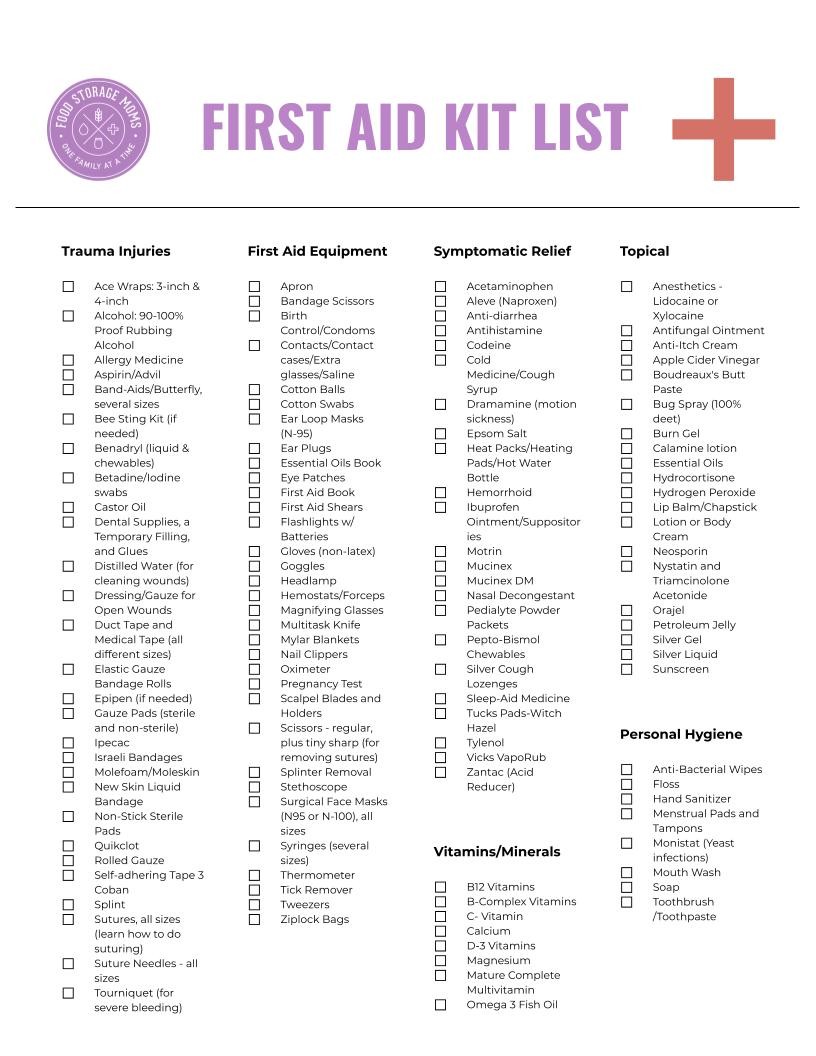
Here’s a picture of one of my first aid kits:
Plano Large Tackle Box. Please note, I use essential oils for soothing illnesses only. I love them and use them every day.
In case you missed this post, What’s In Your First Aid Kit?
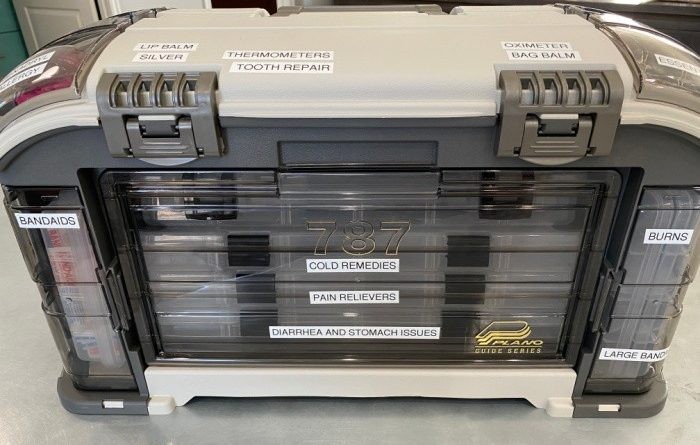
Blankets and Extra Clothing:
Just a note here, never giveaway quilts, they are awesome to keep us warm if the furnace doesn’t work. You can pick them up from thrift stores, and occasionally at garage sales. As we try to shelter in place, we may still be subject to cold and wet conditions, so having warm blankets, and extra clothing, including boots, hats, scarves, gloves, socks, etc.
Flashlights and Lanterns:
If the power goes out, you’ll need ways to light up the rooms in your home. The old standby candles have proven to be riskier for causing house fires, so I’ve suggested to my readers that you consider other options.
I really like solar-powered flashlights and lanterns. Yes, I have regular flashlights and always keep extra batteries in my stash. But my favorite go-to light sources are solar-powered. I have solar flashlights resting on my window sills so they stay charged as long as the sun’s out.
Don’t ever use gas or kerosene lanterns indoors! Seems like every year we read about a family that has perished from using these in a home, camping trailer, or tent.
As you may know, I love Goal Zero products and they have given me several products to review, and I’m extremely grateful for the items. I have purchased many to back up and supplement the main items. I appreciate the Goal Zero products because you can’t beat the quality. They are hands down my favorite sponsor.
If you ever see a Goal Zero “roadshow” at Costco, load up with as many products as you can afford to buy. This is one of many flashlights I highly recommend, Goal Zero Solar Flashlights. No batteries are required. The sun charges it, LOVE it! I also have this lantern: Goal Zero Lantern
Cash:
Just a reminder, if we do lose power the gas station pumps won’t work, and the cash registers at the store may not work either. Some grocery stores have generator backups for a short period of time.
If the grocery store shelves are empty you won’t need cash. You may not be able to buy anything, so it’s critical to be prepared to barter, trade, or share your goods. It’s not IF but WHEN we need to be prepared for the unexpected, we must be ready.
In lieu of currency, you can stock up on items to barter, including your survival skills. People are willing to pay for or trade for skills they need to provide safety for their families.
Baby Items, Pet Supplies, and Essential Items for the Elderly and Special Needs Family Members:
When it comes to the little ones in our home, we need to be sure to include them as we make our prep plans. Have extra diapers, baby wipes, plenty of baby formula, extra clothes, baby-formulated medications, and so many other baby supplies.
Our pets also need to be considered. They eat, drink, poop, and need special attention, particularly when disasters hit. They can often become as scared as we are, they just can’t tell you how they feel.
Only you know what special consideration comes into play with those in your home who may be termed “elderly” or “special needs.” Take stock of the special food, medication, and equipment needs they require on a daily basis. Those needs won’t go away during an emergency situation. As a matter of fact, those needs may multiply or change. Give plenty of thought to what you need to stock up on as you prepare for their unique circumstances.
Final Word
As I’ve written this post and thought of what needed to be said, I’ve realized I’ve really just scratched the surface. Every family is truly unique, and so their needs during a disaster are unique. Hold some family meetings and discuss what is important to each member, then set out a plan to meet the goals and desires as best you can.
Don’t become overwhelmed as you put your preparedness plans together and consider the time, energy, and funds needed to be properly prepared. You can do this!
May God bless all of us to be prepared and self-reliant. Please do whatever you can to get your family prepared for survival. May God Bless this world. Linda
The post How To Get Your Family Prepared For Survival appeared first on Food Storage Moms.

